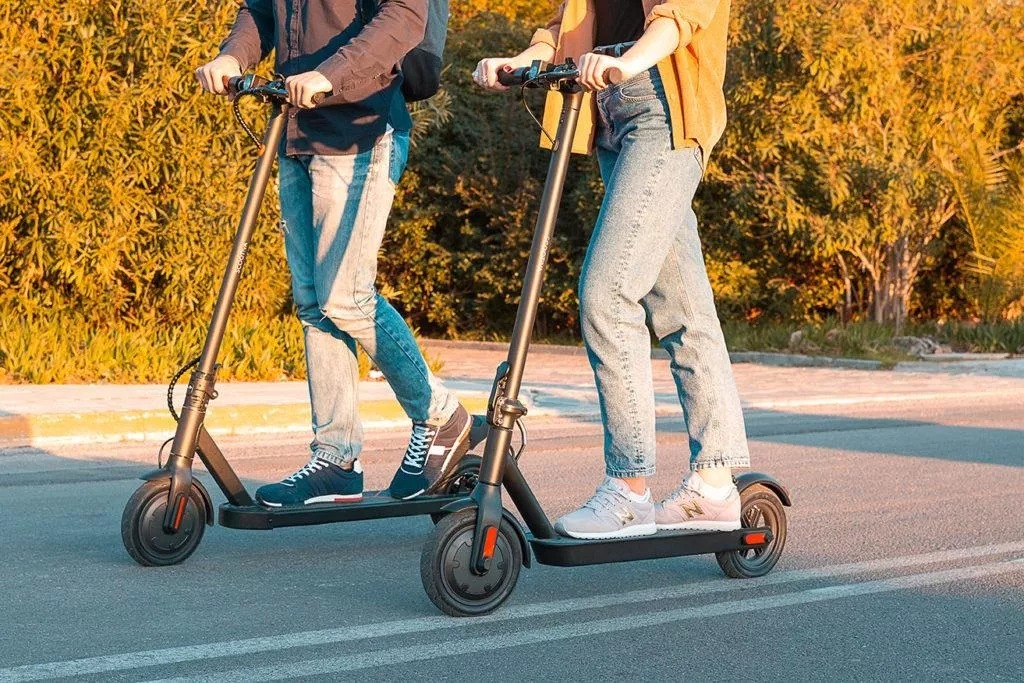Uncontrolled electric scooters roam the streets as responsibility for their regulation has become a hot potato between the police and municipalities.
As clarified in Phileleftheros, scooters are only entitled to operate on cycle lanes or streets with a speed limit of 30 km/h.
However, since such a network and infrastructure linking different areas is nonexistent, scooter users end up riding illegally without being pursued.
Additionally, it has been reported that numerous accidents have occurred, and various complaints have been filed by citizens regarding scooters.
Assistant Traffic Chief Haris Evripides stated to Phileleftheros that “as the police, we have received many reports of scooter violations, possibly more than expected based on what we have to work with. Especially our motorcycle officers are conducting checks and reporting violations. Local authorities, their traffic wardens, and municipalities need to take a closer look at this issue to better enforce the legislation.”
Regarding the claims of municipalities that their officials are not authorized to stop scooter users for checks, even if they are breaking the law, Evripides commented that “unfortunately, it’s an excuse. There are traffic wardens who have the authority to conduct checks anyway.” Furthermore, he said they could approach them for further training.
In general, he stated that they have no problem with enforcement.
“We can conduct checks at any time. What was initially mentioned is that especially local authorities have more say and role. On one hand, concerning enforcement and their municipal traffic wardens, and on the other hand, due to certain provisions of the legislation, under which they can approve additional traffic areas. That is, they can request approval for their areas/streets, where the speed limit will be 30 km/h, especially in city centers, so that scooters can operate.”
He said that areas were planned to be converted into 30 km routes, “but they need to be approved by local authorities to operate. We are waiting for this development.”
There are cycle lanes where they are allowed to move, but he emphasized that they are limited.
“The cycle lane reaches a certain point. The scooter user may need to cross areas, so local authorities may need to approve traffic areas. The next step needs to be taken by local authorities. Currently, we do not have such regulation.”
Evripides noted that accidents occur and require control.
“That’s why our instructions are that when our members spot scooters moving on the road and operating illegally, they report them. It’s serious for the safety of the scooter driver and other drivers,” he said. Finally, he invoked the individual responsibility of scooter users. He urged pedestrians, motorcycle and scooter drivers to be particularly careful when they spot them, as they themselves are vulnerable.
Accidents and complaints are recorded by municipalities
Accidents and complaints related to scooters are recorded by municipalities. However, as reported to us, they do not have the authority to conduct checks, which burdens the Police.
“There have been many accidents, involving both children and adults. It’s a phenomenon we face very often. A serious incident occurred in Phinikoudes between a pedestrian and a scooter,” noted the President of the Union of Cyprus Municipalities and Mayor of Larnaca, Andreas Vyras.
“There are no cycle lanes and network. Infrastructure needs to be developed for scooters to circulate safely. Where will they circulate, on the road or in squares?” he wondered and added that there are no roads with a speed limit of 30 km/h, as the legislation provides.
“There are no registration numbers on scooters, which could be used to identify lawbreakers. Also, there is a problem with scooters being left on sidewalks and other places, restricting access for people with disabilities and citizens in general. It’s difficult in this case to impose fines. Overall, it’s legislation that makes it difficult for municipalities to enforce it.”
He also noted that municipalities find it difficult to conduct checks on offenders. There is no jurisdiction, as Vyras said, for municipal officials to request personal information.
“They are not police officers. They cannot stop a moving vehicle, in other words, stop someone and ask for details.” The only checks by municipalities are towards scooter rental companies. As for police checks, he noted that they are carried out in some areas but not others.
Furthermore, an official from the Egkomi Municipality informed us that they receive complaints regarding scooters and have recorded some accidents.
“In terms of circulation, municipalities are not responsible, but the Police are. If scooter users wear helmets and move on cycle lanes and 30 km/h roads. In Egkomi, we do not have roads with this speed limit, so they can only move on cycle lanes. They don’t comply. However, control is the responsibility of the Police and not the municipality,” he told us.
“At first, controlling scooters was even more difficult because there were too many of them. That’s why six municipalities (Egkomi, Nicosia, Agios Dometios, Strovolos, Aglantzia, Lakatamia) decided to designate specific points for parking up to five scooters. We had to confiscate scooters, but after this action, there was compliance from the rental companies,” it was noted.
In fact, company employees patrol to supervise and ensure they do not obstruct pedestrians.






